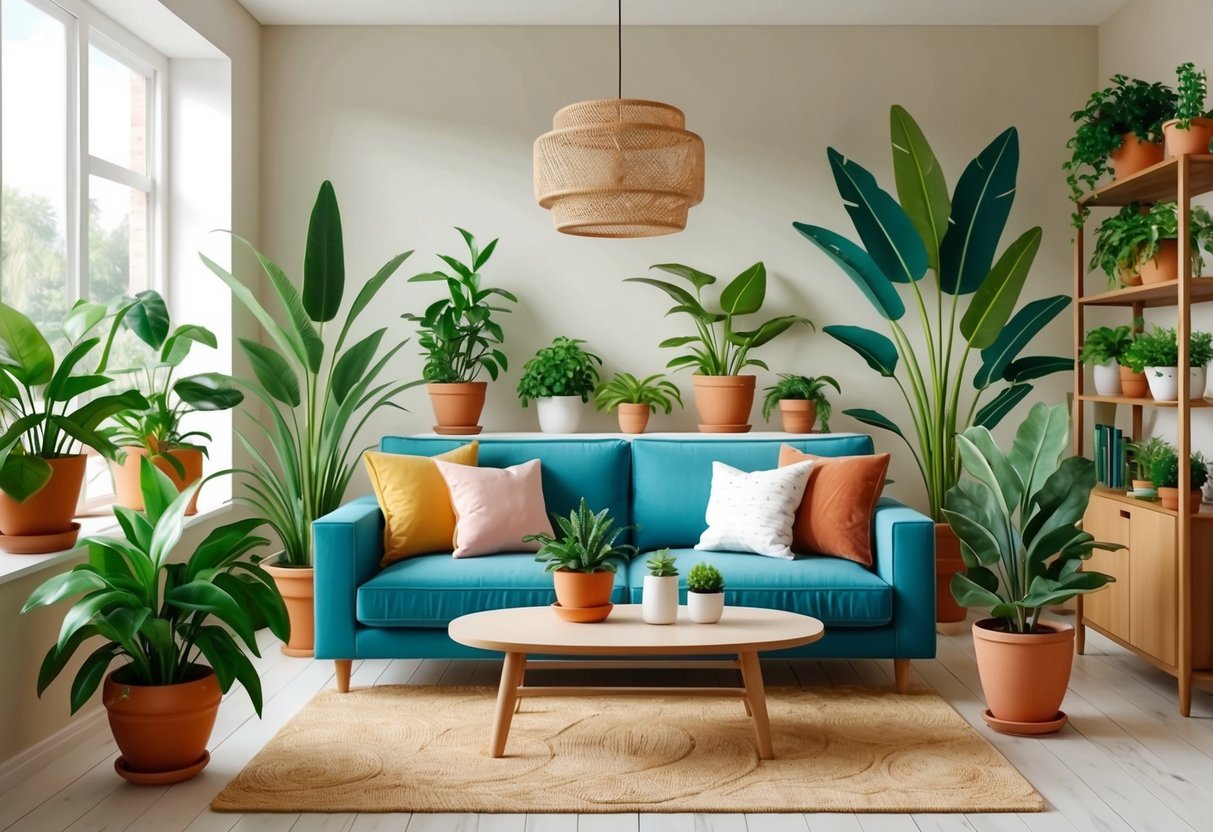
Indoor plants do more than just brighten up a room; they are proven to boost well-being by improving indoor air quality and reducing stress.
Experts agree that certain houseplants–including the spider plant, snake plant, peace lily, and pothos–are among the best indoor plants for purifying air and promoting a calm atmosphere.
By selecting the right air-purifying plants, people can create a healthier and more relaxing home environment.
Bringing these low-maintenance houseplants indoors can help filter toxins from the air while providing an added layer of tranquility.
Research and experts highlight the value of air-cleaning houseplants such as the spider plant, snake plant, peace lily, and pothos for their ability to reduce indoor pollutants and make any room feel more restful.
Expert-Recommended Indoor Plants for Clean Air
Indoor plants offer effective air purification benefits when chosen carefully.
With low maintenance needs and a strong ability to remove toxins, specific species such as sansevieria, spathiphyllum, and pothos are favored by experts for healthier indoor environments and improved well-being.
Snake Plant
The snake plant (Sansevieria trifasciata), sometimes called mother-in-law’s tongue, stands out for its remarkable air purification abilities and ease of care.
It removes harmful toxins like formaldehyde, benzene, xylene, and trichloroethylene from the air.
The snake plant can release oxygen at night, which helps boost air quality in bedrooms and other living spaces.
It tolerates low light and requires only occasional watering, making it a good choice for beginners.
In addition, it adds a modern aesthetic with its tall, upright leaves, fitting well in nearly any indoor setting.
Peace Lily
The peace lily (Spathiphyllum) is widely recommended for its ability to reduce levels of indoor air pollutants including ammonia, benzene, formaldehyde, and trichloroethylene.
Its lush, dark green leaves and striking white flowers make it both an attractive and functional addition to homes.
The peace lily is also one of the few indoor plants that can help keep mold spores in check.
Peace lilies thrive in moderate, indirect light and regular watering, though they can tolerate occasional neglect.
It’s important to note that peace lilies are toxic to pets, so they should be kept out of reach of cats and dogs.
Spider Plant
The spider plant (Chlorophytum comosum) is valued for its ability to filter carbon monoxide, xylene, and formaldehyde from indoor air.
It features arching green-and-white striped leaves that produce small “pups,” making it easy to propagate and share.
Spider plants adapt well to a variety of lighting conditions, even thriving in partially shaded spaces.
They require minimal maintenance and are generally non-toxic, making them suitable for homes with children or pets.
Its rapid growth and easy care further contribute to its popularity as a top indoor air quality choice.
Pothos
Pothos (Epipremnum aureum), sometimes called devil’s ivy, is noted for its hardy nature and ability to grow in a range of lighting conditions, including low light.
It is effective at removing pollutants such as formaldehyde, benzene, and xylene from the air, according to studies and expert recommendations like those at Filti.
Pothos features heart-shaped, trailing leaves that can be trained to grow along shelves or in hanging baskets.
They need only infrequent watering, making them an easy option for those new to indoor plants.
Thanks to their fast growth and tolerance to varying environments, pothos plants are often included on lists of the best houseplants for clean air and low-maintenance indoor plant collections.
Plants Proven to Reduce Stress and Promote Wellbeing
Certain indoor plants have been shown to actively reduce stress, support overall wellbeing, and even improve indoor atmospheres.
These plants are chosen not only for their beauty, but primarily for their positive influence on mood, relaxation, and air quality.
Lavender
Lavender stands out for its ability to promote relaxation and calmness.
Its soothing fragrance is known to lower anxiety levels and contribute to improved sleep, making it popular in bedrooms and meditation areas.
The essential oils naturally released by lavender are used in aromatherapy to help people feel happier and less stressed.
To get the most benefit, people often keep lavender in places where they unwind.
Studies show that its scent can decrease heart rate and blood pressure, supporting overall wellbeing.
For those sensitive to synthetic fragrances, fresh lavender offers a natural way to reduce stress and create a tranquil indoor environment.
Experts consistently recommend lavender as one of the best indoor plants for health and stress relief.
Aloe Vera
Aloe vera provides both mood-enhancing properties and air purification benefits.
It is valued for its ability to remove harmful chemicals from the air, which can make indoor spaces feel fresher and more pleasant.
The clear gel in its leaves is widely used for skin care, but simply having aloe vera as a houseplant can also support relaxation.
This plant thrives with minimal care, making it suitable for both home and office environments.
Studies suggest that tending to living plants, such as aloe vera, can help relieve anxiety and support mental wellbeing.
Its subtle presence can add a calming touch to rooms, helping people feel more at ease by providing cleaner air and a splash of greenery.
Aloe vera appears frequently on expert lists of plants that help reduce stress and clean indoor air.
Chinese Evergreen
Chinese evergreen is prized for its air purifying abilities and its positive impact on indoor wellbeing.
With broad, decorative leaves, it brings a touch of nature inside and promotes a sense of calm in homes and workplaces.
Scientific studies indicate that Chinese evergreen can filter toxins and boost humidity, which may help people feel less fatigued and more relaxed.
It’s well-suited to various lighting conditions, offering flexibility for plant lovers who want to increase indoor greenery without worrying about sunlight.
Research highlights the role of Chinese evergreen in improving indoor air quality and providing psychological comfort.
Its ability to both enhance surroundings and reduce stress has made it a popular choice among those looking to promote relaxation and feel happier indoors.